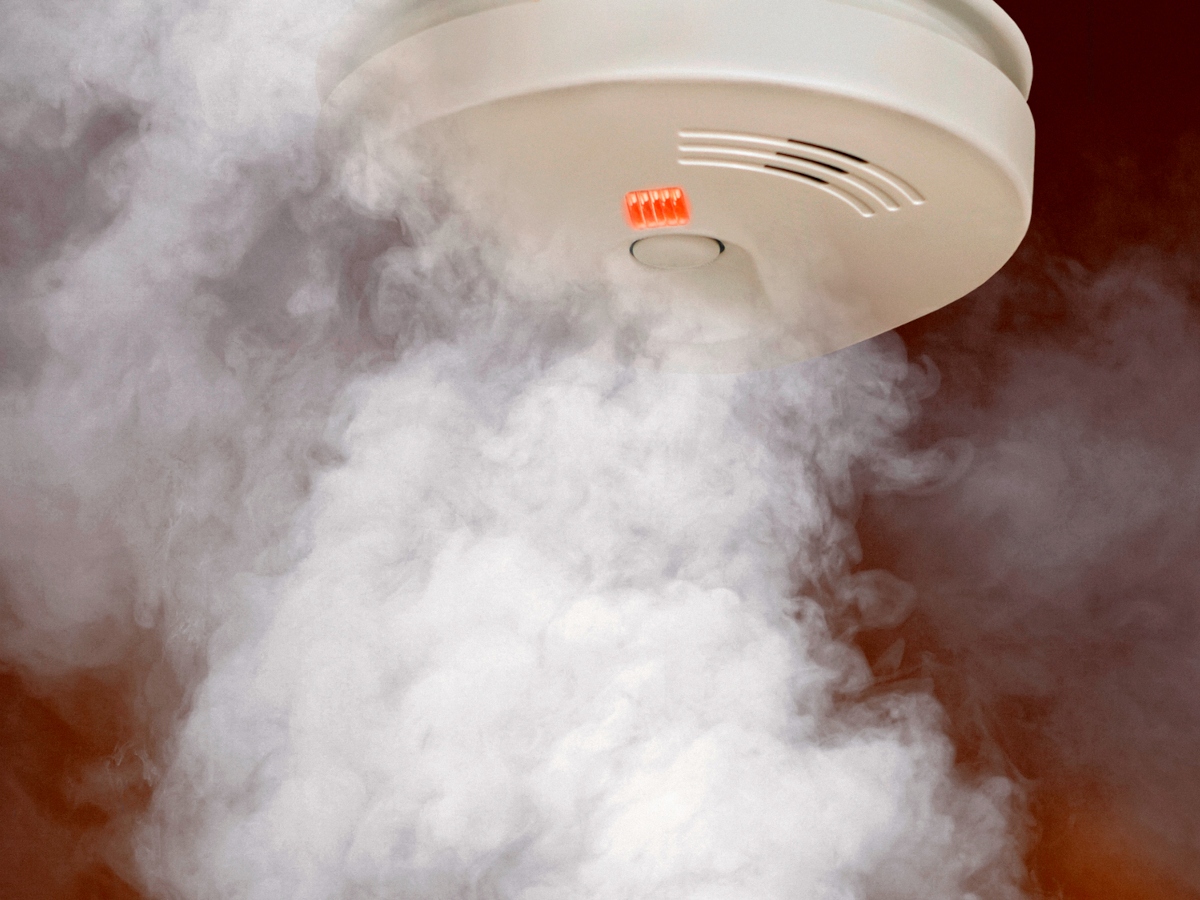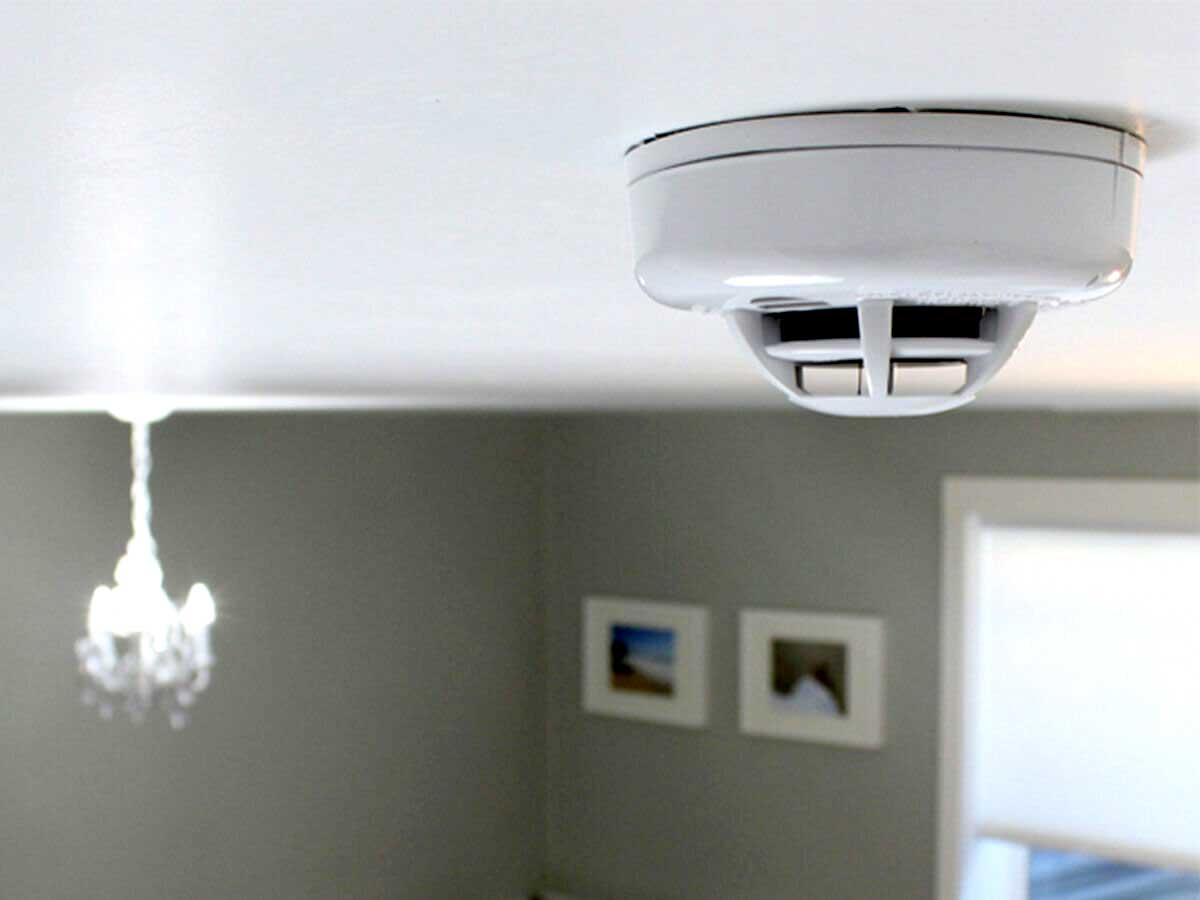A common thought for people who own or rent a home is “how long do smoke detectors last?” This is a perfectly legitimate concern. If your home’s smoke detectors run out of juice or no longer function as designed, everyone you love and everything you cherish will be put in harm’s way. It’s time to simplify smoke detectors, the seemingly complex device hanging from your ceiling. Continue reading this article to shed light on the truth surrounding the actual lifespan of these life-saving devices.
Smoke Detector Lifespan
If your smoke detector is 10 years old or older, the National Fire Protection Association (NFPA) says it’s time to replace it. Even if you recently replaced the batteries in your smoke detector, it’s still in your best interest to replace it with a new one. The same goes for pressing the test button and getting seemingly normal results. It’s time for a new smoke detector. The test button doesn’t analyze your detector’s sensor—mainly just the battery, electronics, and alert system.
The bottom line is there is no guarantee a smoke detector that’s 10 years old or older will function properly. Therefore, it’s not suitable to keep your family safe. Even with a fresh pair of batteries, it’s best to switch out a detector that’s a decade old. In fact, there’s even potential for smoke detectors to malfunction or completely fail prior to the 10-year mark.
Why Don’t Smoke Detectors Last Forever?
Some people assume planned obsolescence is the reason most smoke detectors don’t last longer than a decade. Planned obsolescence refers to the concept that devices are made to be broken in a never-ending quest for more revenue. In other words, some people believe engineers who design smoke detectors and other devices make them in a manner that limits their lifespan. This forces customers to buy a new unit each decade or even sooner to maximize profitability. However, this theory is not true.
Most smoke alarms self-test for smoke once every minute. Some smoke detectors perform self-testing once every 40 seconds. Furthermore, these devices monitor the air for smoke throughout the day and night. These devices are constantly working to safeguard your home and your loved ones, meaning their internal components gradually wear down.
Do the math on the number of self-tests that smoke detectors perform in a 10-year period and you will find they complete a whopping seven million tests. Until smoke detector technology improves, the components of these devices will continue to wear down around the decade mark, hiking the chances for failure all the more.
Additional Reasons Smoke Detectors Fail
Smoke detectors collect all sorts of gunk, making their gradual failure that much more understandable. Smoke alarms are magnets for:
- Dust
- Dirt
- Cobwebs
- Allergens
- Insects
- Insect droppings
- Additional debris
Making matters worse is the fact that most homeowners don’t perform smoke detector maintenance aside from replacing the batteries. Therefore, the chances of failure are much higher. Dirt and other gunk find its way into the smoke detectors’ internal components, compromising their functionality, sometimes much sooner than expected.

Signs It’s Time To Replace Your Smoke Detector
Instead of wondering, “How long do smoke detectors last”, it’s better to be proactive and pay close attention to your home’s smoke detectors. If you notice any of the signs detailed below, it is a clue the time has come to replace your home’s smoke detector.
- Chirping. This is usually the biggest giveaway that it’s time to replace your smoke detector. Especially if the sound is consistent. As soon as you notice the chirping, make a mental note to replace your detector.
- Discoloration. It’s natural for your smoke detector to lose its luster over the years. However, if the detector inside your home is turning yellow, then it’s time to replace it. The yellow color most likely stems from bromine, the detector’s fire retardant. Over time, the bromine on your detector will turn yellow after being exposed to heat, UV light, and oxygen. The change in color takes some time to happen. Therefore, if you looked at your smoke detector and it was all yellow, you need to be ready to install a new system.
- False Alarms. If your smoke detector is continuously going off with no flame in sight, it’s time for a new system.
- Doesn’t Pass the Test. If you own a smoke detector, you likely know that it’s important to test your system once each month. A properly functioning smoke detector will beep a few times after pressing the test button. A smoke detector that’s not working properly won’t beep after you press the test button.
If you upgrade to a new and better smoke detector, you won’t have to deal with the annoyance of an unpredictable smoke alarm.
How To Check Your Home’s Smoke Detectors
You can check your home’s smoke detectors on your own to determine if they need replacement. Take a look at the smoke detectors’ expiration dates. If you find the smoke detector is past its expiration date or if it has been in your home for 10 years or longer, replace it right away. You can find the smoke detector’s expiration date on the sticker along the back section of the alarm or its side.
As we discussed earlier, you can check your smoke detectors with the test button. We recommend doing this for systems that aren’t quite 10 years old yet. You will need to replace a detector that’s a decade old.
To test your system, press the smoke detector’s test button to ensure they make an audible noise that can be heard throughout the entirety of your home. The detector’s manufacturer might label the test button as the “hush” button. You can find the test button on the detector’s face. Press down on the button and hold it for a couple seconds to verify it actually works as designed.

Some Smoke Detectors Fails Before the 10-Year Mark
The 10-year mark for smoke detector replacement is a general estimate of smoke detector lifespan. There is no guarantee your home’s smoke detectors will prove functional for an entire decade. Ask anyone who inspects homes or works in the smoke detector industry about the lifespan of these devices and you will learn some of them fail in half a decade or even sooner. The bottom line is your smoke detector will not have the potential to save your life unless it works exactly as it should. When in doubt, be on the safe side by replacing your smoke detector sooner rather than later.
Some Detectors Need Fresh Batteries
If you don’t add fresh batteries to your smoke detector at the appropriate intervals, they will not function properly. Furthermore, the use of low-quality batteries and batteries that lack a full charge have the potential to reduce the effectiveness and lifespan of smoke detectors. So don’t use old rechargeable batteries in your smoke detector. Instead, use brand new batteries that are guaranteed to have a full charge.
You should change your smoke detector batteries at least one time each year. If the detector emits a chirping sound, then this indicates the battery power is low. You should replace the battery right away.
It will also help to clean the smoke detector and the surrounding areas with a handheld vacuum after changing the batteries. A handheld vacuum will suck up all the dirt, dust, cobwebs, dead insects, allergens and other grime in and around your smoke detector.
While you are up on the ladder, be sure to write your smoke detector’s expiration date so you know exactly when it should be replaced. Set a reminder on your smartphone’s calendar to trigger a prompt that alerts you when the time comes to replace the smoke alarm.
Create a Safe and Secure Space at Home With ONIT Home
ONIT is here to help you safeguard your home. We provide smart security, solar energy, water filtration, insurance and concierge services. ONIT takes pride in providing products and high-tech solutions exactly the way customers want it. Reach out to us today to learn more about how you can get a $1500 voucher you can split between our services and get a quote. Give us a call at 1-833-433-0331 or online by requesting a free smart home quote.



